Chef Eric Olson parks his gray Ford 350 beside an abandoned residential lot. A set of chef’s whites swing on hangers in the back of the cab as he applies the brake. At the edge of the non-descript field, Olson crouches down, cradling a lacey weed I recognize as an unwanted guest in my garden. His slim black and blue flannel shirt, modern-cut jeans and boyish zeal for the outdoors belie the three decades he’s spent in some of the world’s most respected kitchens. “Look at the white buds on this mallow. These can be pickled like capers, or used for decoration. And these,” he says, pulling a leaf and folding it entirely into his mouth, “Can be julienned into a salad.”
Lots of chefs forage. But the guilelessness that leads Olson to seek out unwanted and forgotten plants also compels him to forage for potentially written-off people to work in his kitchen. Felons, flunkies––all are welcome. He doesn’t just disregard boundaries and thou-shalt-nots; he is blind to them.

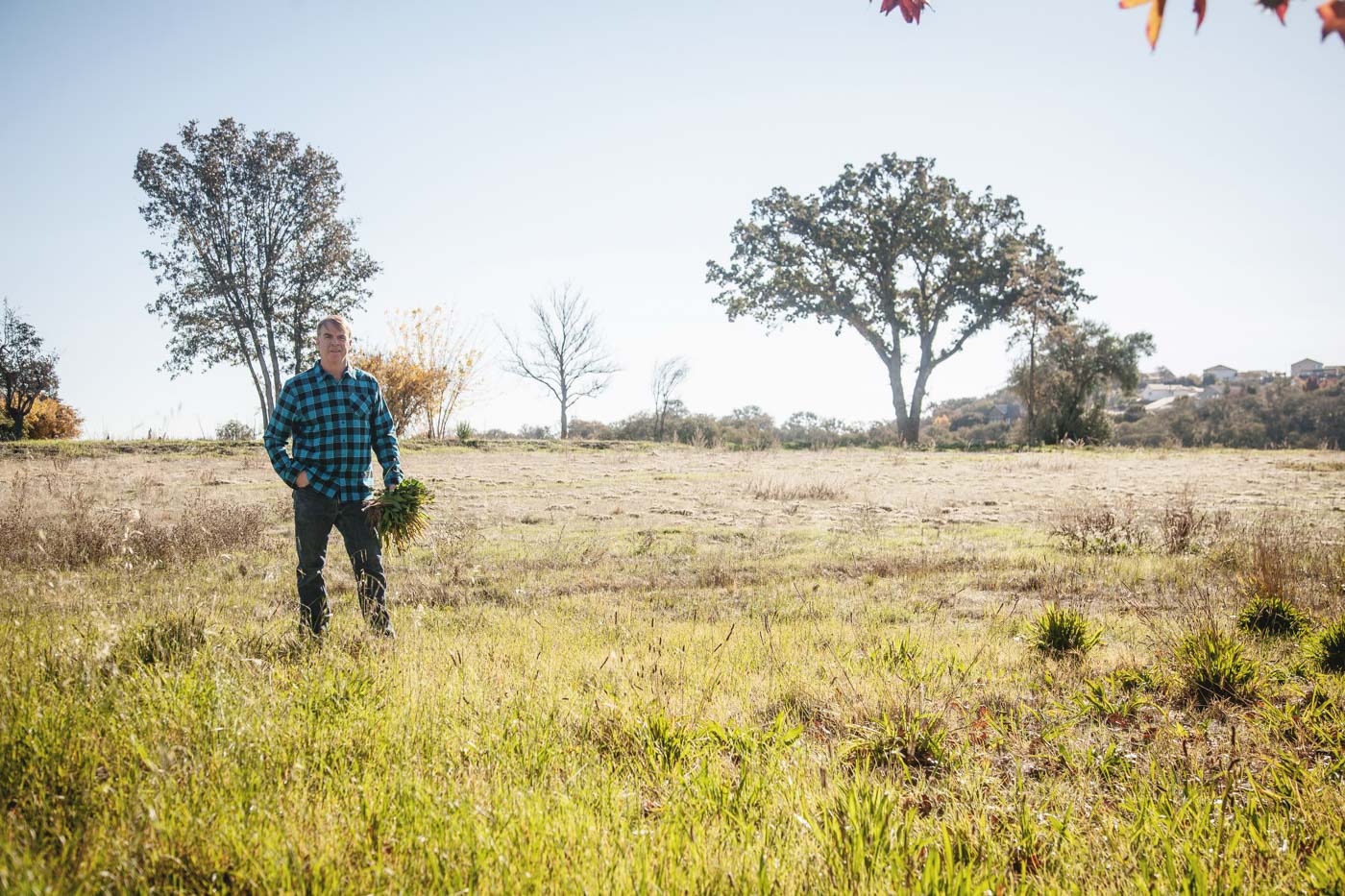
Olson points out that a nearby gathering of cattails indicates a water source, I assume for the weeds. It takes a moment before I realize he’s teaching me how to forage for my own water. “You know,” he says, “Just in case everything ever shuts down and you needed access to a water supply.” He’s referring to the fall of civilization, a subject I hadn’t expected to cover with the Executive Chef of Cello, a high-end wine country resort restaurant that is no stranger to the extravagantly well-heeled.
The Allegretto Vineyard Resort lies within view of these cattails on the outskirts of Paso Robles, a burgeoning city on California’s Central Coast that can’t quite decide if it’s still a downhome little ranching town or a high falutin’ food-and-wine playground. The resort, a multi-million dollar, 20-acre paean to Mediterranean ideals, is an obvious bid on the latter.
It’s no surprise that Olson chooses to make his home here; the tension between luxury and economy, safety and danger, abundance and scarcity pulls across his life and work. As a child growing up in the affluent city of Los Altos, California, Olson lived with his doctor father, television personality mother, a maid and a Mercedes-Benz in the garage. But all school year long, he itched for summer days when he could explore the Northern California woods with his great-aunts and uncles, cloistered naturalists who taught him the rudiments of foraging for indigenous edible and medicinal plants––an art they called, “wildcrafting.”
After joining the army and while stationed in Europe, he delighted in taking young women out on dates, showing off a flair for fine dining as learned from his father––a master in the art of good living. He experienced the best service of his life with one such woman––a drug dealer––who placed a wad of cash in the server’s palm before their meal. Shortly after, Olson decided to enroll in culinary school; even at their inception, his culinary pursuits flirted with the louche.
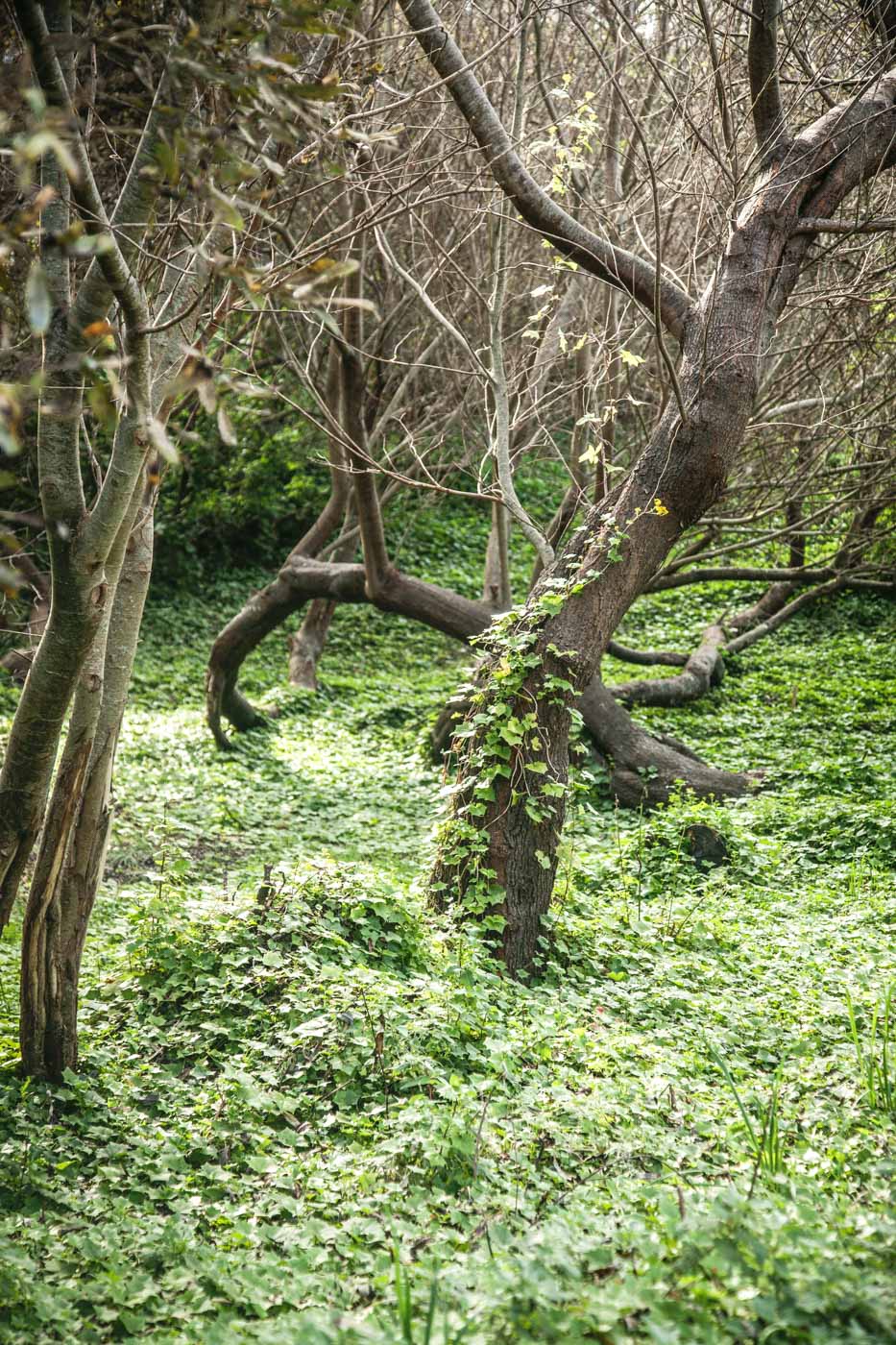
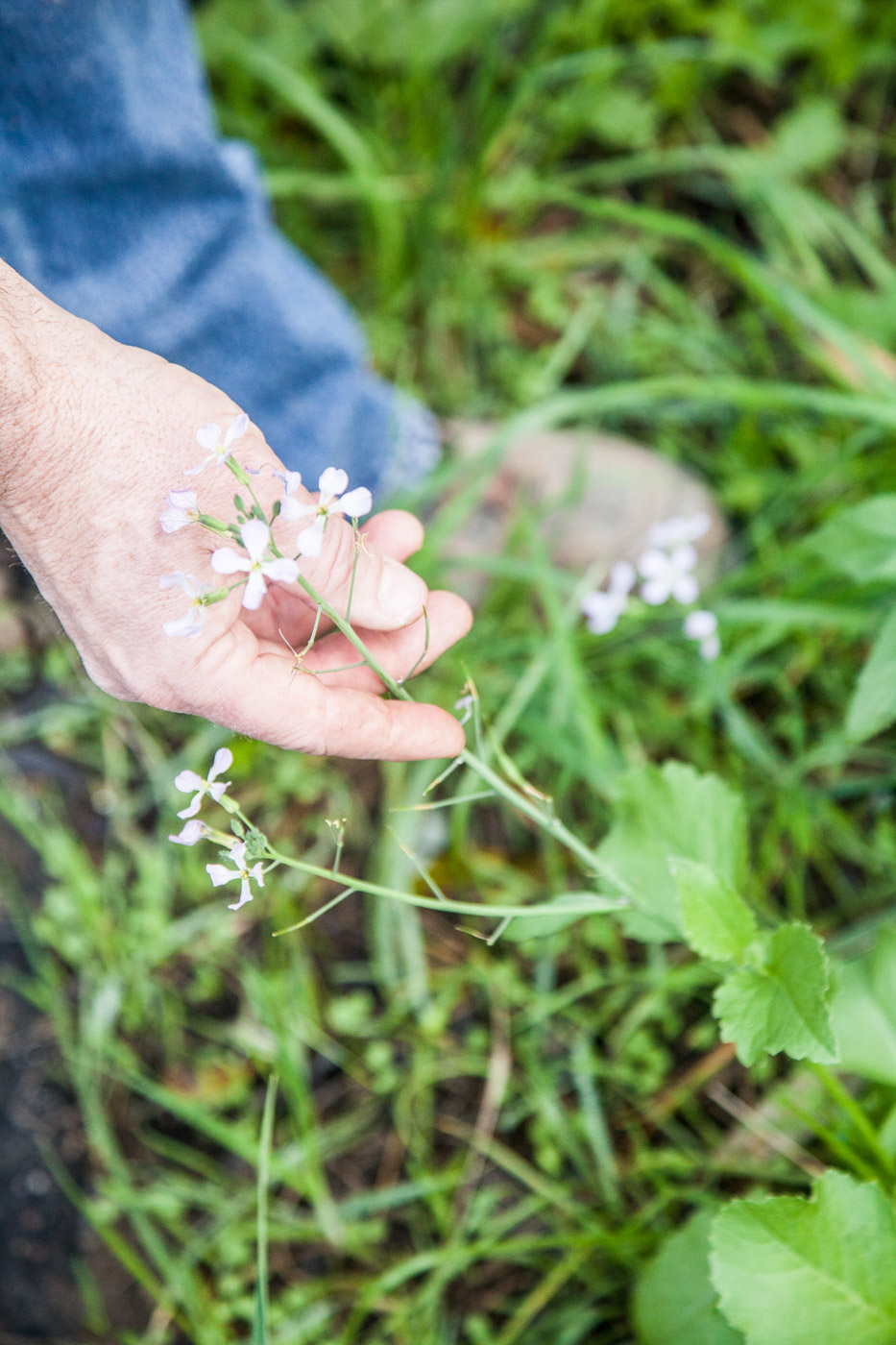


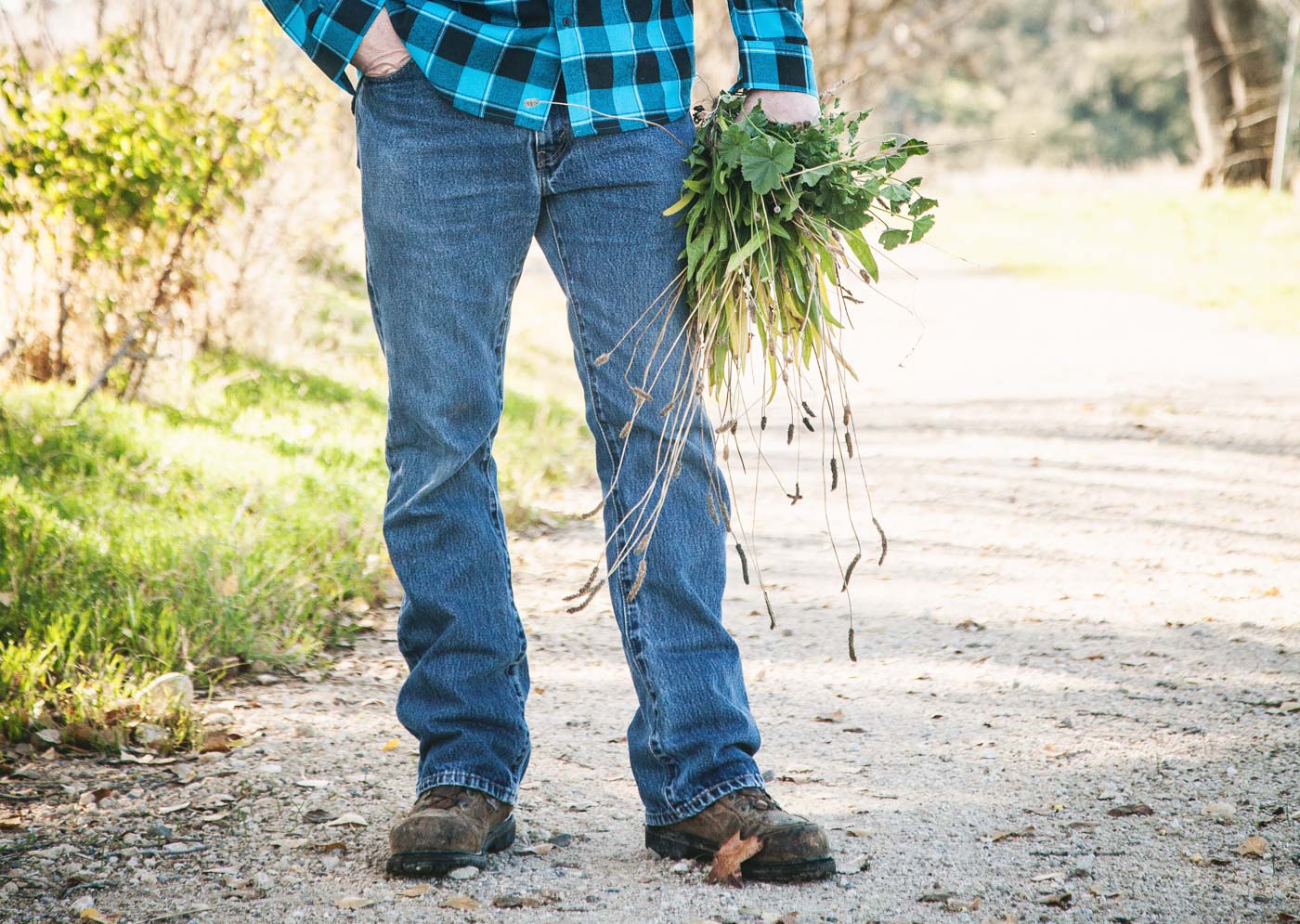
Now with a bundle of plantain leaves and a prickly spray of milk thistle in his arms, we walk back to the truck and drive to Paso Robles’ westside, where Olson’s favorite oak tree stands at an intersection flanked by vineyards.
“The best way to find good acorns is to follow a squirrel,” says Olson, walking over piles of fat acorns rolling among their detached caps. To process these nuts into a high-protein flour, first he sorts them for cracks or worm holes, then soaks them in a bucket. Those that float, he tosses, splitting the remainder in half lengthwise, removing the inside meat and dropping it in seven pots of boiling water, one after the other, for a few minutes each time. After drying them out in a low-temperature oven, he grinds the acorns to flour for muffins, tortillas, pancakes or bread.
When the Los Angeles riots broke out in 1992, Olson was the Executive Chef at the Burbank Hilton & Convention Center, where he says his wildcrafting mentality and military background came in handy. While many of those in L.A. were splitting town, he chose to stay, entrusting a firearm to his produce driver. He then called the LAPD to offer free coffee and pie to uniformed officers. “The next thing you know, special weapons teams were checking in. We started a midnight buffet, and the hotel was full of law enforcement, with an M-16 at every table and cop cars filling the parking lot.”

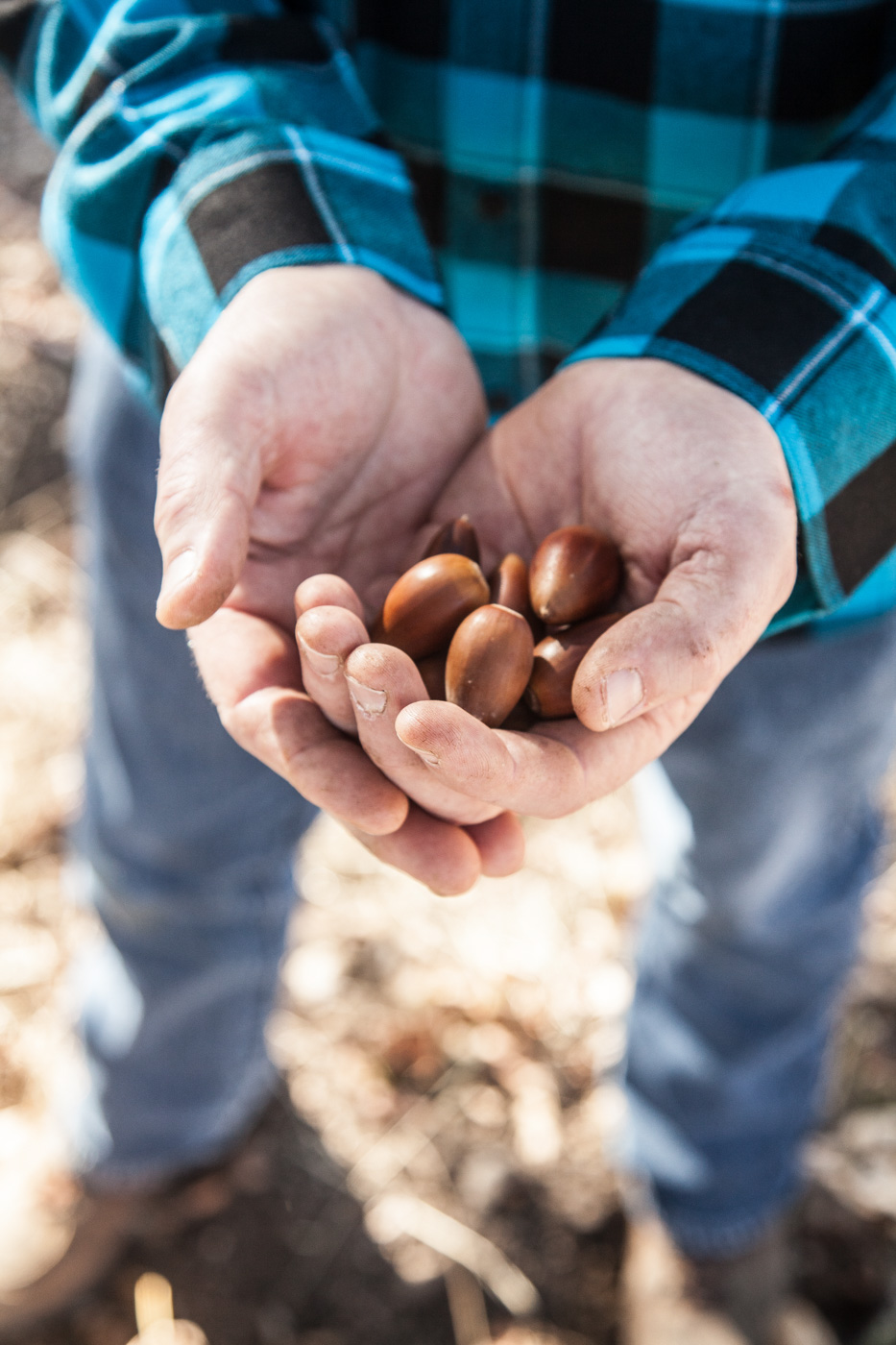
Olson befriends those on the other side of the law, too. “I’ve made solid citizens out of felons in my kitchen,” he says, referring not to any official rehabilitation program, but rather to the affection he has for people looking to rebuild their lives––particularly ex-convicts. “Drugs are one thing, but some of these guys are violent. And if you’re giving them knives in a close environment, that’s risky! But it’s a respect thing.”
Olson pockets a few acorns to add to our box of native plants––one could hardly call them weeds now––and we drive up the Santa Lucia Mountains, stopping briefly to gather fennel pollen a few feet from the highway. “Ladybugs are a lucky sign,” Olson says, pointing to an ochre blossom that hosts no less than nine little beetles.
We move on, cresting the mountains and descending into Cambria, a damp coastal hamlet where nettles and wild radishes grow freely. On a carpet of wild ivy beside a residential street, we search, optimistically, for chanterelle mushrooms at the base of the oaks and pines. But it’s a drought year and we have no such luck. “Next time,” Olson says, with a crooked smile.
Though they’re a highlight of his resumé and certainly a gauge of his pedigree, the four years Olson spent as Executive Chef of the upscale Ojai Valley Inn & Spa were some of his least fulfilling, career-wise (“I didn’t learn anything during the good times,” he says). He’s more interested in talking about what came after: working for a group of deep-pocketed, hippie idealists here in Cambria, who sought to change the world through food.
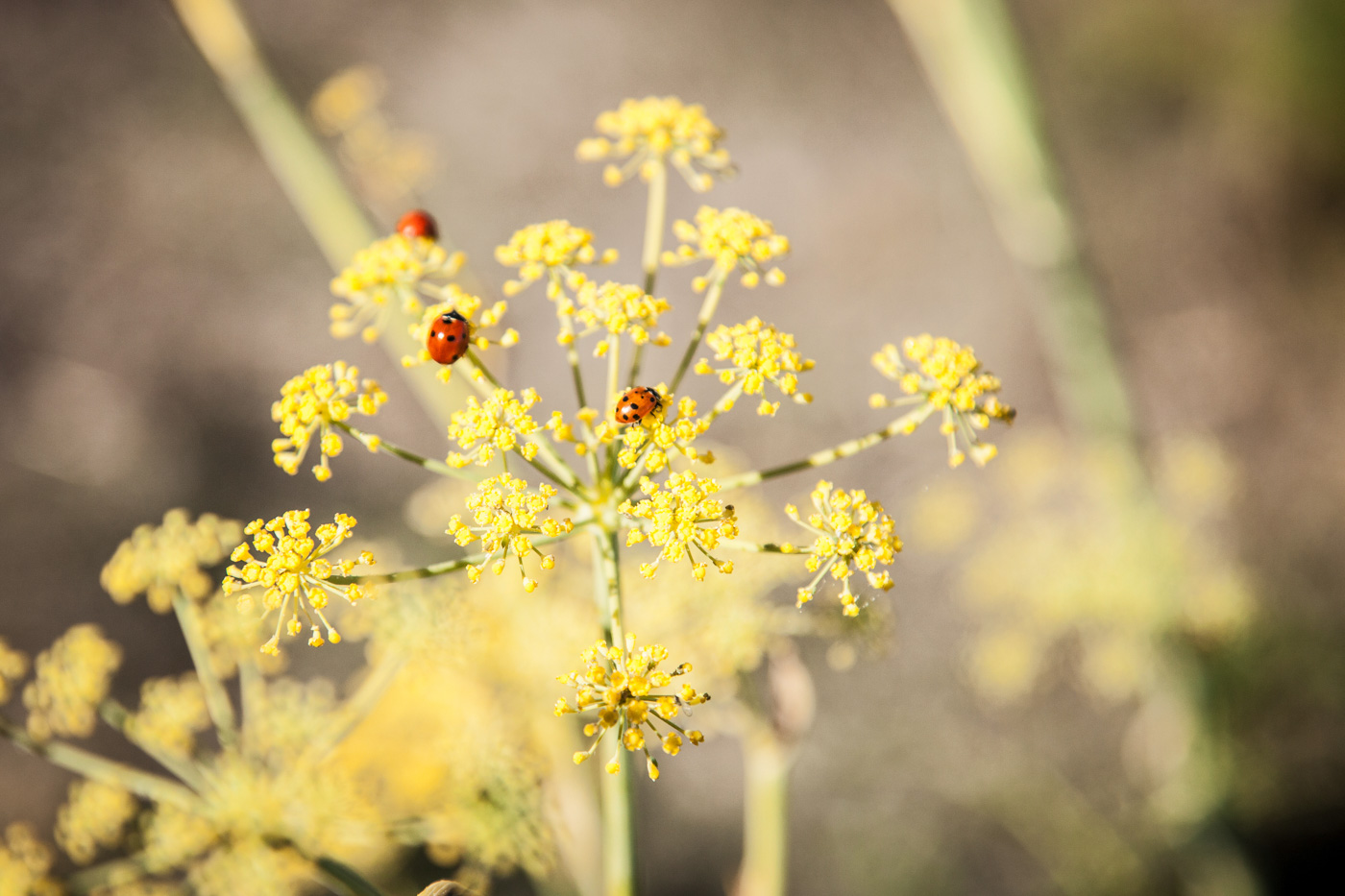
More than a restaurant, Centrally Grown was conceived as a utopian compound that served foods bearing any number of alt-modifiers (e.g. vegan, grass-fed, organic, raw and gluten-free, etc.), dishes like raw seaweed salad, whole wheat pizza with wild nettles and local kale lemonade. During his four years there, Olson’s main task was to research, build and manage a massive food truck for Centrally Grown, a project both fascinating and doomed to fail. Painted top-to-bottom in psychedelic murals depicting the coastline, Olson’s brand new 42-foot mobile kitchen commanded attention when it drove by, which was precisely the idea.
Centrally Grown wasn’t zoned to host a food truck, so, in a decidedly Machiavellian move, Olson licensed it with the nearby state prison so that the county couldn’t meddle. “We did weddings on the beach without a permit,” Olson says, grinning. “If anyone called to ask questions, the prison wouldn’t release anything because…it’s a prison.” Their only requirement was that the mobile kitchen serve lunch to the guards on duty, which Olson and his team did regularly.
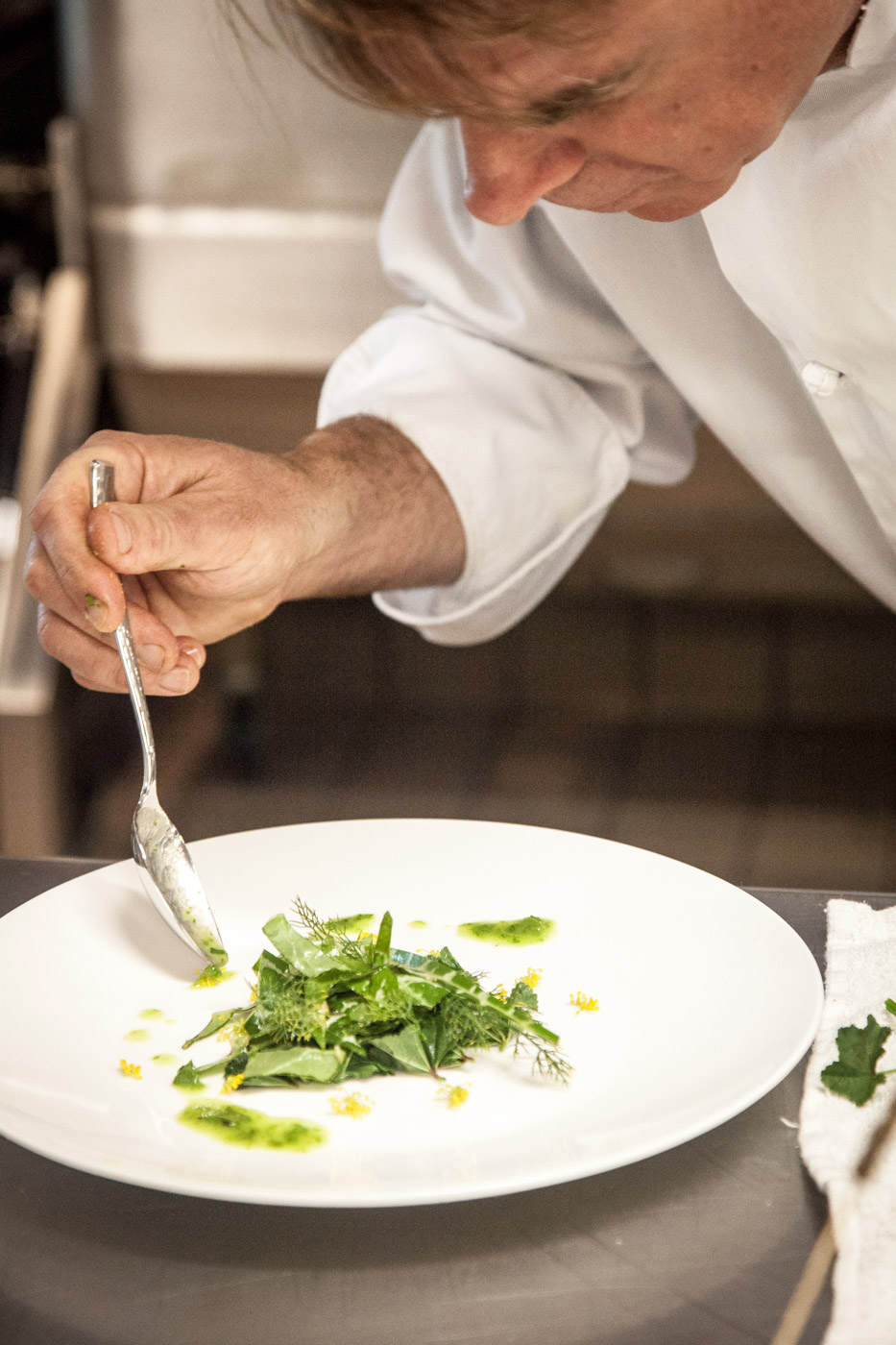
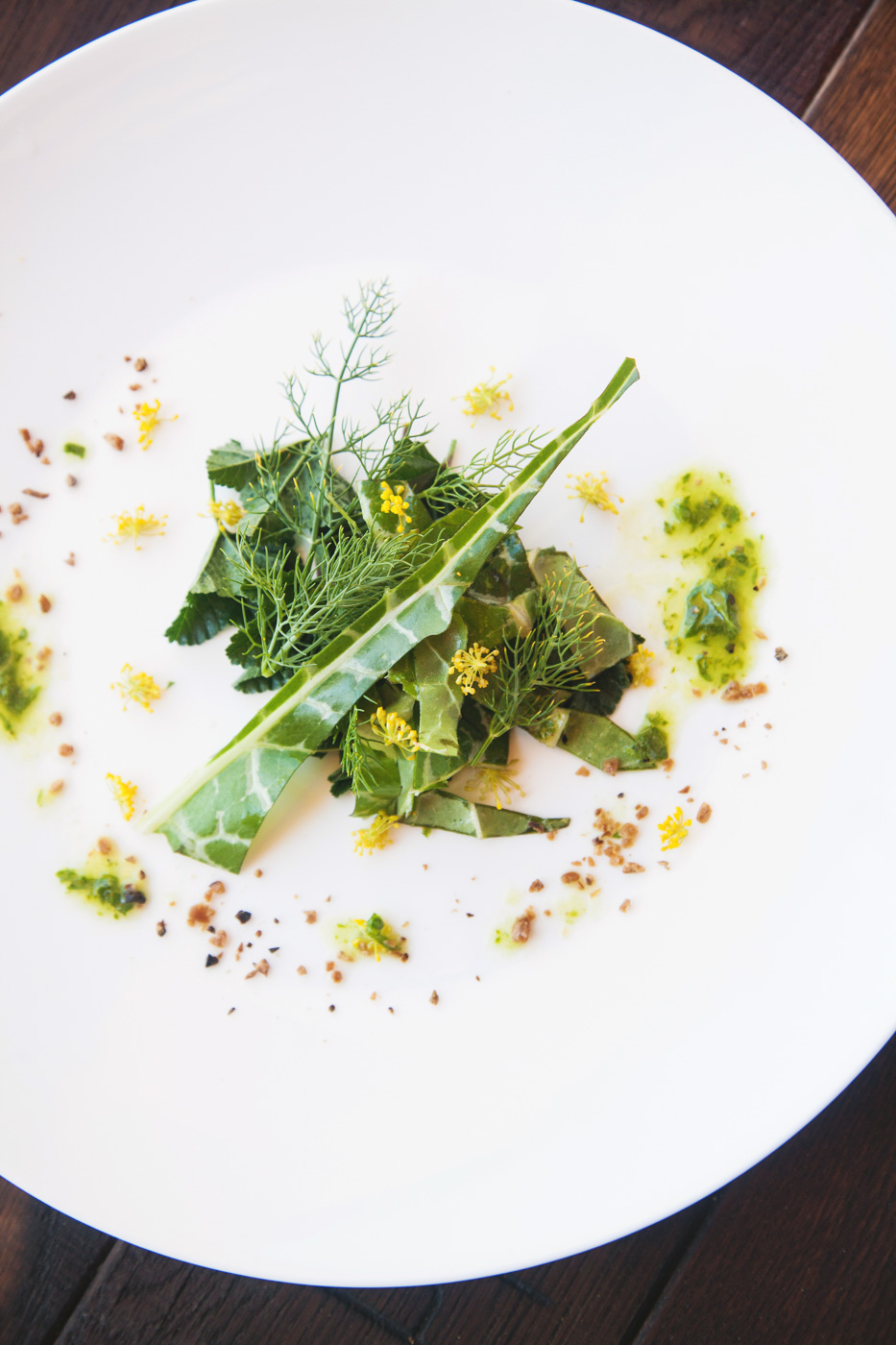

While driving to events, Olson often pulled over to teach his staff how to forage. For all its optimism, though, Centrally Grown didn’t last. Guests’ dogs peed on the edibles planted in the restaurant’s parking lot, unaware they were intended for kitchen use. Drugs addled the staff. They dropped reservations, filled orders incorrectly. The freewheeling food truck lifestyle caught up with the fifty-something Olson, too. “I was in an old man’s body playing a young man’s sport,” he says. “I had to get out.”
What seemed like a detour on Olson’s career highway crystallized his values, though. He’s back with a corporate hotel (the Allegretto is part of the Ayres Hotel Collection) but he brings his birthright of wildcrafting to bear on everything he touches, from foraged mushroom risotto and acorn-infused vodka to wildflowers atop salmon. And he continues to invite even the roughest of folks in. “People with nowhere to go, people willing to work hard––the kitchen’s good for them because it’s warm, no one’s shooting at them and they get to eat. I don’t wear a collar or carry a Bible, but that’s my ministry.”
He drives the long, winding road back to the Allegretto, where the kitchen hums with new stainless steel appliances. Olson dons his whites and washes our finds, clipping prickles off the milk thistle, snipping fennel fronds and blending pollen with mallow leaves, Parmigiano and a bit of extra virgin olive oil. After a few deft movements and a flourish of his knife, he presents a plate of savage beauty––a salad as untamed as it is elegant.

——
Allegretto Vineyard Resort
2700 Buena Vista Dr, Paso Robles, CA 93446

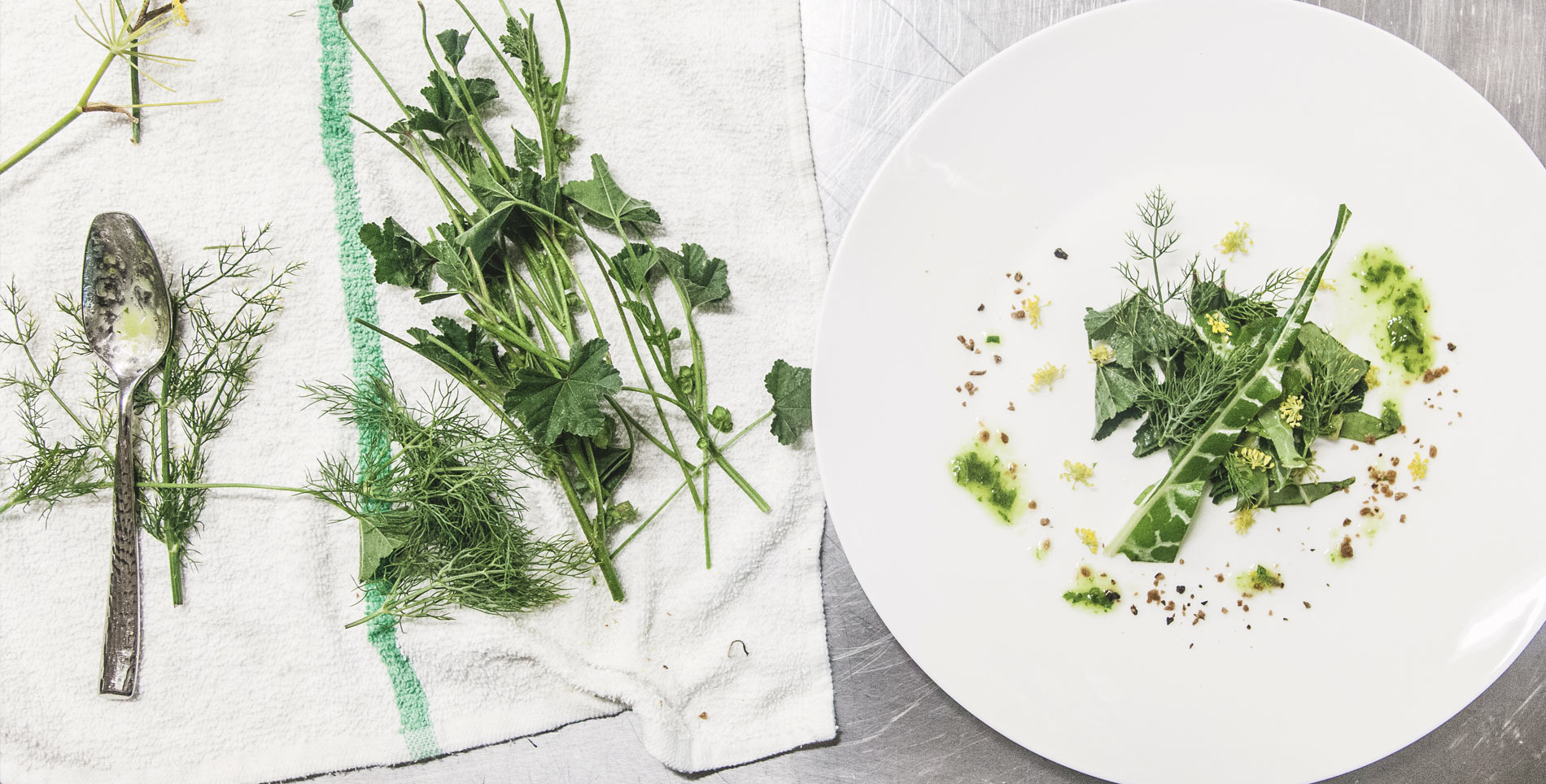

Our comments section is for members only.
Join today to gain exclusive access.